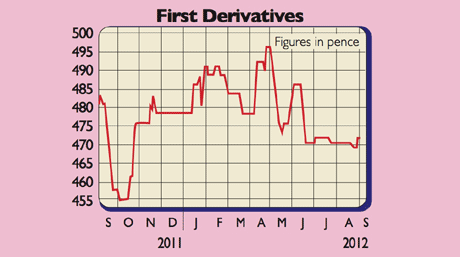Get the latest financial news, insights and expert analysis from our award-winning MoneyWeek team, to help you understand what really matters when it comes to your finances.
You are now subscribed
Your newsletter sign-up was successful
Want to add more newsletters?
The May 2010 stockmarket flash crash' was caused by a barrage of automated selling by computerised trading systems. My worry is that just over two years later it looks as if lessons have not been learned.
Instead, this type of event is increasing in frequency. In July this year a trading glitch caused mayhem around the $90bn Facebook initial public offering. Then, last month, a coding error brought American broker-dealer Knight Capital to its knees. Given that 60%-70% of all trades are now made by machines, until these complex and interlinked systems are completely overhauled, the financial industry could at any moment experience another IT catastrophe.
But this is all good news for First Derivatives, a Newry-based provider of software (31% of sales) and consulting (69%) services to the capital markets.
Try 6 free issues of MoneyWeek today
Get unparalleled financial insight, analysis and expert opinion you can profit from.

Sign up to Money Morning
Don't miss the latest investment and personal finances news, market analysis, plus money-saving tips with our free twice-daily newsletter
Don't miss the latest investment and personal finances news, market analysis, plus money-saving tips with our free twice-daily newsletter
First Derivatives' main customers are 90 or so City institutions that work across different asset classes, often in high trading volumes using multiple systems. Its winning mixture of market knowledge and technical expertise ideally positions it for the next wave of technology spending. This could be driven by global regulators hoping to clean up this accident-prone space once and for all.
First Derivatives (Aim: FDP)

In terms of trading, the chairman, David Anderson, said in late June that the "company had made a strong start to the year, and that it continues to trade in line with market expectations". However, he did qualify this by saying that "the full effects of budget constraints, regulation and globalisation continue to impinge on our customers".
House broker Charles Stanley is pencilling in turnover and underlying earnings per share of £56.1m and 38.9p respectively for the year ending February 2013, rising to £64.6m and 48.7p one-year later. That puts the stock on a price/earnings (p/e) ratio of 12.2, with a dividend yield of 2.3%.
However, I would rate the stock on a multiple of nine times earnings before interest, taxes,depreciation and amortisation (EBITDA). After adjusting for the £20.9m of net debt secured against a £18.9m property portfolio, that produces an intrinsic worth of around 550p per share.
First Derivatives is not a share for the risk-averse investor. The main threats facing the business include regulatory changes, foreign-exchange fluctuations, a slowdown across the sector and the fact that it is a small player.
That said, the shares certainly aren't expensive. And they could soon become even cheaper, should the Knight Capital debacle catapult law-makers into action that forces the industry to rip out and/or upgrade its often unfit-for-purpose trading networks.
Get the latest financial news, insights and expert analysis from our award-winning MoneyWeek team, to help you understand what really matters when it comes to your finances.
Paul gained a degree in electrical engineering and went on to qualify as a chartered management accountant. He has extensive corporate finance and investment experience and is a member of the Securities Institute.
Over the past 16 years Paul has held top-level financial management and M&A roles for blue-chip companies such as O2, GKN and Unilever. He is now director of his own capital investment and consultancy firm, PMH Capital Limited.
Paul is an expert at analysing companies in new, fast-growing markets, and is an extremely shrewd stock-picker.
-
 Financial education: how to teach children about money
Financial education: how to teach children about moneyFinancial education was added to the national curriculum more than a decade ago, but it doesn’t seem to have done much good. It’s time to take back control
-
 Investing in Taiwan: profit from the rise of Asia’s Silicon Valley
Investing in Taiwan: profit from the rise of Asia’s Silicon ValleyTaiwan has become a technology manufacturing powerhouse. Smart investors should buy in now, says Matthew Partridge